Related Research Articles
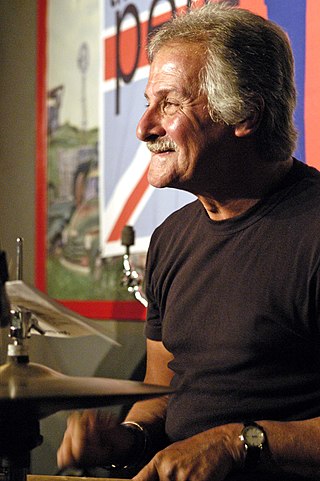
Randolph Peter Best is an English musician who was the drummer for The Beatles from 1960 to 1962. He was dismissed immediately prior to the band achieving worldwide fame and is one of several people who have been referred to as a fifth Beatle.
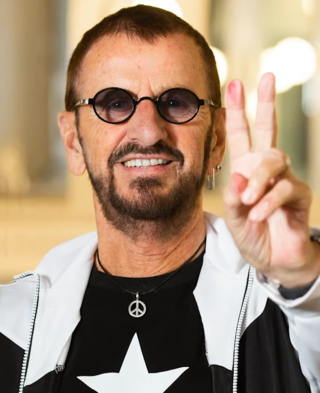
Sir Richard Starkey, known professionally as Ringo Starr, is an English musician, songwriter and actor who achieved international fame as the drummer for the Beatles. Starr occasionally sang lead vocals with the group, usually for one song on each album, including "Yellow Submarine" and "With a Little Help from My Friends". He also wrote and sang the Beatles songs "Don't Pass Me By" and "Octopus's Garden", and is credited as a co-writer of four others.
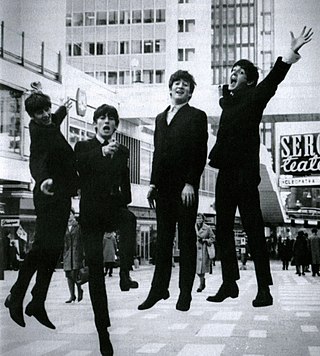
The fifth Beatle is an informal title that has been applied to people who were at one point a member of the Beatles or who had a strong association with John Lennon, Paul McCartney, George Harrison, and Ringo Starr. The "fifth Beatle" claims first appeared in the press immediately upon the band's rise to global fame in 1963–64. The members have offered their own views as to who should be described with the title:

Brian Samuel Epstein was an English music entrepreneur who managed the Beatles from 1962 until his death in 1967.
Apple Records is a record label founded by the Beatles in 1968 as a division of Apple Corps Ltd. It was initially intended as a creative outlet for the Beatles, both as a group and individually, plus a selection of other artists including Mary Hopkin, James Taylor, Badfinger, and Billy Preston. In practice, the roster had become dominated by the mid-1970s with releases of the former Beatles as solo artists. Allen Klein managed the label from 1969 to 1973, then it was managed by Neil Aspinall on behalf of the Beatles and their heirs. Aspinall retired in 2007 and was replaced by Jeff Jones.

James George Nicol is an English drummer and business entrepreneur. He is best known for sitting-in for Ringo Starr in the Beatles for eight concerts of the Beatles' 1964 world tour during the height of Beatlemania, elevating him from relative obscurity to worldwide fame and then back again in the space of a fortnight. Nicol had hoped that his association with the Beatles would greatly enhance his career but instead found that the spotlight moved away from him once Starr returned to the group, and in 1965 his subsequent lack of commercial success culminated in bankruptcy. In 1975, after having worked with a number of different bands which included a successful relationship with the Spotnicks, and several more while living in Mexico, he left the music business to pursue a variety of entrepreneurial ventures.
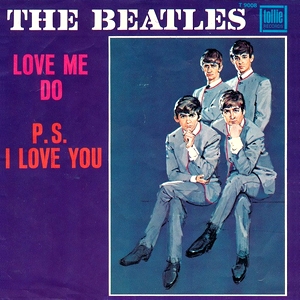
"Love Me Do" is the official debut single by the English rock band the Beatles, backed by "P.S. I Love You". When the single was originally released in the United Kingdom on 5 October 1962, it peaked at number 17. It was released in the United States in 1964, where it became a number one hit. Re-released in 1982 as part of EMI's Beatles 20th anniversary, it re-entered the UK charts and peaked at number 4.

Rory Storm was an English musician and vocalist. Born in Liverpool, Storm was the singer and leader of Rory Storm and the Hurricanes, a Liverpudlian band who were contemporaries of The Beatles in the late 1950s and early 1960s. Ringo Starr was the drummer for the Hurricanes before joining the Beatles in August 1962.

"Please Please Me" is a song released by the English rock band the Beatles. It was their second single in the United Kingdom, and their first in the United States. It is also the title track of their first LP, which was recorded to capitalise on the success of the single. It is a John Lennon composition, although its ultimate form was significantly influenced by producer George Martin.
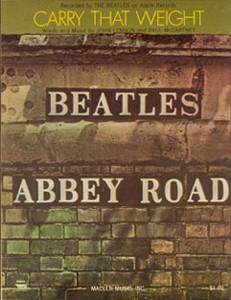
"Carry That Weight" is a song by the English rock band the Beatles from their 1969 album Abbey Road. Written by Paul McCartney and credited to Lennon–McCartney, it is the seventh and penultimate song in the album's climactic side-two medley. It features unison vocals in the chorus from all four Beatles, a rarity in their songs. It is preceded by "Golden Slumbers" and segues into "The End".

Maureen Starkey Tigrett, also known as Mo Starkey, was a hairdresser from Liverpool, England, best known as the first wife of Ringo Starr, the Beatles' drummer. When she was a trainee hairdresser in Liverpool, she met him at the Cavern Club, where the Beatles were playing. Starr proposed marriage at the Ad Lib Club in London on 20 January 1965. They married at the Caxton Hall Register Office, London, in 1965, and divorced in 1975.
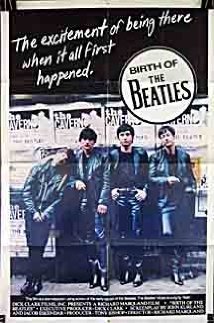
Birth of the Beatles is a 1979 American biographical film, produced by Dick Clark Productions and directed by Richard Marquand. The film was released into cinemas worldwide, except in the United States, where it was shown as a TV film on ABC. The film focuses on the early history of the Beatles. It was released nine years after the announced break-up of the Beatles themselves, and is the only Beatles biopic to be made while John Lennon was still alive. Pete Best, the Beatles' original drummer, served as a technical advisor for the production.
"You Know What to Do" was the second song written and recorded by George Harrison with the Beatles. It was recorded on 3 June 1964 but remained unreleased until its inclusion on the band's 1995 outtakes compilation Anthology 1.
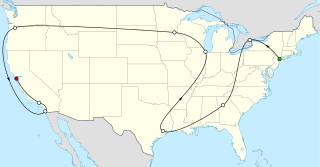
The Beatles staged their second concert tour of the United States in the late summer of 1965. At the peak of American Beatlemania, they played a mixture of outdoor stadiums and indoor arenas, with historic concerts at Shea Stadium in New York and the Hollywood Bowl. Typically of the era, the tour was a "package" presentation, with several artists on the bill. The Beatles played for just 30 minutes at each show, following sets by support acts such as Brenda Holloway and the King Curtis Band, Cannibal & the Headhunters, and Sounds Incorporated.
The Beatles Anthology is a documentary television series on the career of the Beatles. It was broadcast on UK television in eight parts on ITV between 26 November and 31 December 1995, while in the United States it was seen as three feature-length episodes on ABC between 19 and 23 November 1995. It was released in greatly expanded form as an eight-volume VHS set and an eight-disc LaserDisc set on 5 September 1996. The series was re-released on DVD in 2003, with an 81-minute special-features disc.
After the break-up of the Beatles in April 1970, John Lennon, Paul McCartney, George Harrison and Ringo Starr enjoyed success as solo artists and collaborated with each other on numerous occasions, including on both studio and live recordings. However, none of these collaborations included all four members, with the exception of "Free as a Bird" (1994), "Real Love" (1995) and "Now and Then" (2023).

In His Life: The John Lennon Story is a 2000 American made-for-television biographical film about John Lennon's teenage years, written by the film's executive producer, Michael O'Hara, and directed by David Carson.

The English rock group the Beatles toured the United States and Canada between 19 August and 20 September 1964. The 32 concerts comprised the second stage of a world tour that started with the band's tour of Europe, Hong Kong, and Australia and finished with their UK Autumn tour. The shows in the United States were a return to the country after their brief February 1964 tour.
References
- ↑ "Jimmy Nicol". beatlesbible.com. 23 October 2023.
- ↑ "Het mysterieuze verhaal van Beatles-invaldrummer Jimmie Nicol" [The mysterious story of Beatles substitute drummer Jimmie Nicol]. 3voor12.vpro (in Dutch). 23 April 2014.
- ↑ "The Beatles Bible - Television: Treslong, Hillegom, Netherlands". 5 June 1964.
- ↑ On 5 June 1964 VARA organized a Beatles concert in Café Restaurant Treslong in Hillegom as part of their three day visit to the Netherlands as part of their world tour, which got a television registration. On 8 June 1964 a complete summary of the Beatles' visit to the Netherlands was broadcast.
The visualization of the three day visit showed:
* arrival at Schiphol Airport – young women wearing Volendam folk costumes welcoming, offering tulips and traditional Dutch hats.
* the concert at Treslong.
* a roundtrip by boat through the canals of Amsterdam. The Beatles visiting the red light district De Wallen was not shown.
* arrival at De Doelen Hotel in Amsterdam.
* the concert at the Veilinghallen in Blokker.
* Waving goodbye while entering an airplane at Schiphol Airport heading for the next destination Hongkong. - ↑ "The Beatles - You Can't do That [Festival Hall, Melbourne, Australia]". YouTube .
- ↑ "The Beatles in New Zealand". New Zealand Ministry for Culture and Heritage. Archived from the original on 12 March 2008. Retrieved 2 April 2008.
- The Spectator, Volume 213, 1964
- Baker, Glenn A (1982). The Beatles Down Under: the 1964 Australia & New Zealand tour. Glebe, NSW Australia: Wild & Woolley.
- Baker, Glenn A (1985). The Beatles Down Under: the 1964 Australia & New Zealand tour (2 ed.). Ann Arbour, Michigan, USA: Pierian Press. ISBN 0-87650-186-2.
- Hutchins, Graham (2004). Eight Days a Week:the Beatles' tour of New Zealand 1964. Auckland, NZ: Exisle. ISBN 0-908988-55-9.